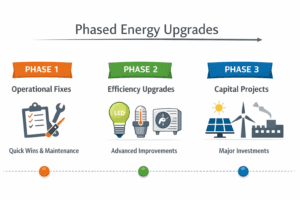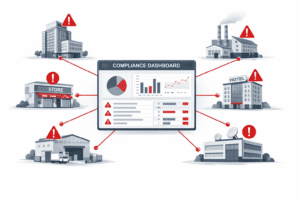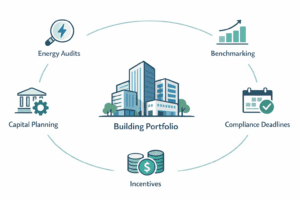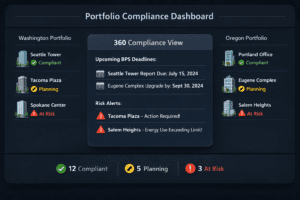Introduction
As the world continues to prioritize sustainability and combat climate change, energy benchmarking laws have emerged as a crucial step in promoting energy efficiency and reducing carbon emissions. In this blog, we will delve deeper into the significance of the new benchmarking law and its impact on energy consumption. By understanding the key provisions, compliance requirements, consequences of non-compliance, and available tools and resources, building owners and managers can ensure their buildings meet the necessary benchmarks. Let’s explore this topic in detail.
Understanding the New Benchmarking Law

The Benchmarking Law is designed to promote transparency and accountability in energy consumption. It requires building owners to annually report their energy usage data. This legislation typically applies to commercial buildings, multifamily residential properties, and certain public buildings. By disclosing energy consumption data, stakeholders can identify areas for improvement and develop strategies to promote energy efficiency.
The law sets forth key provisions and requirements that building owners need to understand. These provisions may vary depending on your jurisdiction, so it is crucial to familiarize yourself with the specific regulations in your area. To comply with the benchmarking law, building owners must gather comprehensive energy usage data, including electricity, natural gas, and water consumption. They must also conduct analysis and submit accurate and timely reports according to the reporting guidelines provided by the local authority.
Importance of Compliance
Complying with the benchmarking law goes beyond meeting regulatory requirements; it brings numerous benefits for both building owners and the environment.
A. Impact on Energy Efficiency and Sustainability Goals
Benchmarking provides building owners with valuable insights into their energy consumption patterns and performance compared to industry standards. It allows them to identify areas of energy waste and make informed decisions to optimize systems, reduce operating costs, and improve energy efficiency. Compliance with the benchmarking law fosters a culture of sustainability, encouraging building owners to adopt eco-friendly practices and contribute to a greener future.
B. Positive Influence on Environmental Initiatives
Reducing energy consumption is a crucial step in mitigating climate change and preserving natural resources. By complying with the benchmarking law, building owners actively participate in global efforts to combat environmental challenges. Their contribution in disclosing energy usage data and implementing energy-saving measures helps drive innovation and supports wider environmental initiatives.
Steps to Determine Compliance
To ensure compliance with the benchmarking law, building owners should follow a comprehensive process that covers several key steps:
A. Awareness and Understanding
It is essential to stay informed about the benchmarking requirements and obligations specific to your jurisdiction. Regularly check for updates or changes to the legislation, ensuring you remain in compliance.
B. Data Collection
Collecting accurate and comprehensive energy usage data is vital for effective benchmarking. Gather information on electricity, natural gas, and water consumption, ensuring you have access to reliable data sources. This may involve working closely with utility companies or investing in energy management systems that track and record real-time energy usage.
C. Verification and Analysis
Once the data has been collected, it’s time to analyze and verify its accuracy. Scrutinize the collected data, compare it against historical records, and identify areas for improvement. Look for patterns or anomalies that could indicate energy inefficiencies or opportunities for optimization.
D. Reporting and Compliance
Prepare and submit the required benchmarking reports within the designated timeframe. Follow the reporting guidelines provided by your local authority to ensure compliance. Submitting accurate and timely reports demonstrates your commitment to energy transparency and compliance with benchmarking law.
Consequences of Non-Compliance
Non-compliance with the benchmarking law can have serious implications for building owners or managers. Understanding the potential consequences is crucial for motivating adherence to the law’s requirements:
A. Fines and Penalties
Failure to submit required reports or meet benchmarking deadlines can result in financial penalties. These penalties vary depending on the jurisdiction but can be substantial, impacting the building owner’s bottom line.
B. Legal Consequences
Non-compliance can lead to legal action, potentially tarnishing a building owner’s reputation and incurring additional legal costs. Legal consequences may include lawsuits from tenants or regulatory authorities seeking compliance or other damages.
C. Disqualification from Incentive Programs
Non-compliant buildings may be disqualified from participating in energy efficiency incentive programs or miss out on potential benefits. These programs often offer financial incentives, tax breaks, or other rewards for complying with energy benchmarks and implementing sustainable practices.
To mitigate these consequences, it is crucial for building owners to prioritize compliance, allocate resources for data collection and reporting, and actively engage with the benchmarking process.
D. Tools and Resources for Compliance
In the digital era, various tools and resources are available to assist building owners in meeting benchmarking requirements:
E. Energy Benchmarking Software
Specialized software designed for energy benchmarking can streamline the data collection, analysis, and reporting processes. These tools provide user-friendly interfaces, automate calculations, and generate compliance reports efficiently, saving time and effort for building owners and managers.
F. Government Resources and Support
Local or national government websites often provide detailed guidelines and resources to assist building owners in understanding and complying with benchmarking laws. These resources may include step-by-step guides, FAQs, and training materials. Government support may also include dedicated helplines or email contacts where building owners can seek guidance on compliance-related issues.
By utilizing these tools and resources, building owners can navigate the benchmarking process more efficiently and effectively, ensuring compliance while optimizing energy performance.
Tips for Improving Compliance

Building owners can enhance their compliance efforts by implementing the following tips:
A. Develop an Internal Compliance Program
Establish an internal system to track energy consumption, manage data collection, and ensure timely reporting. Assign responsibilities to designated staff members with expertise in energy management. Regularly review and update the compliance program to adapt to changing regulations or technology advancements.
B. Engage with Energy Service Providers
Collaborate with energy service providers to identify energy-saving opportunities and implement effective conservation measures. These professionals can conduct energy audits, provide recommendations for improvements, and help optimize your building’s energy performance. Engaging with experts in the field can yield significant energy savings and ensure compliance with the benchmarking law.
C. Educate Building Occupants
Promote energy awareness among building occupants and encourage them to adopt energy-saving habits. Conduct training sessions, provide informational materials, and communicate the importance of energy efficiency throughout the building. Engaged occupants can significantly contribute to reducing energy waste and achieving compliance with benchmarking requirements.
By adopting these best practices, building owners can not only meet compliance requirements but also achieve long-term energy savings and operational efficiency.
Conclusion
Compliance with the new benchmarking law is crucial for building owners to contribute to energy efficiency, sustainability, and environmental conservation. By understanding the provisions, adhering to reporting requirements, and utilizing available tools and resources, building owners can ensure compliance and reap the benefits of improved energy performance. Embrace the benchmarking journey today and pave the way for a greener future.
Remember, the Benchmarking Law is not just a regulatory obligation but an opportunity to drive positive change in the built environment while optimizing your property’s energy use. Act now, and ensure your building is compliant with this important legislation. Complying with the benchmarking law is a commitment to energy transparency, sustainability, and a better future for all.
Discover how VertPro.com can elevate your property’s energy efficiency to new heights. We are your ultimate destination for all things related to Commercial Energy Audits, Benchmark Compliance consultancy, and access to our state-of-the-art Construction Marketplace. As trailblazers in the industry, VertPro® empowers Building Owners and Property Managers across the nation with innovative SaaS technology-based solutions. From Energy Benchmarking to Energy Audits/RCx Plus, we’re dedicated to ensuring compliance with over 60 Energy Benchmarking and Energy Efficiency Laws.
Now is the time to seize the opportunity to maximize your property’s energy potential and value. Explore VertPro.com’s comprehensive solutions today and let us be the catalyst for the transformation your property deserves. Your energy-efficient future starts here!















